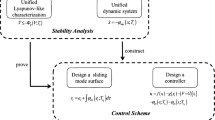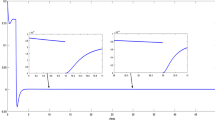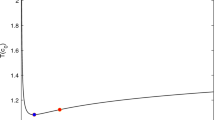Abstract
This paper investigates impulsive chaotic synchronization of discrete-time switched systems with state-dependent switching strategy. The parameter-dependent Lyapunov function (PDLF) technique is used to establish stability criteria for a class of switched systems consisting of both stable and unstable subsystems. With these criteria, sufficient conditions are given to achieve observer-based impulsive chaotic synchronization. Examples are presented to illustrate the criteria.
Similar content being viewed by others
References
Lakshmanan, M., Murali, K.: Chaos in Nonlinear Oscillators: Controlling and Synchronization. World Scientific, Singapore (1996)
Han, S.K., Kurrer, C., Kuramoto, Y.: Dephasing and bursting in coupled neural oscillators. Phys. Rev. Lett. 75(17), 3190–3193 (1995)
Blasius, B., Huppert, A., Stone, L.: Complex dynamics and phase synchronization in spatially extended ecological systems. Nature 399(6734), 354–358 (1999)
Kocarev, L., Halle, K.S., Eckert, K., Chua, L.O., Parlitz, U.: Experimental demonstration of secure communications via chaotic synchronization. Int. J. Bifurc. Chaos 2(3), 709–713 (1992)
Khadra, A., Liu, X.Z., Shen, X.M.: Application of impulsive synchronization to communication security. IEEE Trans. Circuits Syst. I, Fundam. Theory Appl. 50(3), 341–351 (2003)
Khadra, A., Liu, X.Z., Shen, X.M.: Impulsively synchronizing chaotic systems with delay and applications to secure communication. Automatica 41(9), 1491–1502 (2005)
Pecora, L.M., Carroll, T.L.: Synchronization in chaotic systems. Phys. Rev. Lett. 64(8), 821–824 (1990)
Ott, E., Grebogi, C., Yorke, J.A.: Controlling chaos. Phys. Rev. Lett. 64(11), 1196–1199 (1990)
Heagy, J.F., Carroll, T.L., Pecora, L.M.: Synchronous chaos in coupled oscillator systems. Phys. Rev. E 50(3), 1874–1885 (1994)
Agiza, H.N., Matouk, A.E.: Adaptive synchronization of Chua circuits with fully unknown parameters. Chaos Solitons Fractals 28(1), 219–227 (2006)
Park, J.H., Lee, S.M., Kwon, O.M.: Adaptive synchronization of genesio–tesi chaotic system via a novel feedback control. Phys. Lett. A 371(4), 263–270 (2007)
Yassen, M.T.: Controlling chaos and synchronization for new chaotic system using linear feedback control. Chaos Solitons Fractals 26(3), 913–920 (2005)
Zhang, H.B., Liao, X.F., Yu, J.B.: Fuzzy modeling and synchronization of hyperchaotic systems. Chaos Solitons Fractals 26(3), 835–843 (2005)
Morguo, O., Solak, E.: Observer based synchronization of chaotic systems. Phys. Rev. E 54(5), 4803–4811 (1996)
Chen, M.Y., Zhou, D.H., Shang, Y.: A new observer-based synchronization scheme for private communication. Chaos Solitons Fractals 24(4), 1025–1030 (2005)
Chen, S.H., Zhang, Q.J., Xie, J., Wang, C.P.: A stable-manifold-based method for chaos control and synchronization. Chaos Solitons Fractals 20(5), 947–954 (2004)
Yang, T., Chua, L.O.: Impulsive stabilization for control and synchronization of chaotic systems: Theory and application to secure communication. IEEE Trans. Circuits Syst. I, Fundam. Theory Appl. 44(10), 976–988 (1997)
Branicky, M.S.: Multiple Lyapunov functions and other analysis tools for switchedand hybrid systems. IEEE Trans. Autom. Control 43(4), 475–482 (1998)
Lakshmikantham, V., Liu, X.Z.: Impulsive hybrid systems and stability theory. Dyn. Syst. Appl. 7(1), 1–10 (1998)
Liberzon, D.: Switching in Systems and Control. Springer, Berlin (2003)
Lu, J.H., Zhou, T.S., Chen, G.R., Yang, X.S.: Generating chaos with a switching piecewise-linear controller. Chaos: Interdiscip. J. Nonlinear Sci. 12(2), 344–349 (2002)
Liu, X.Z., Teo, K.L., Zhang, H.T., Chen, G.R.: Switching control of linear systems for generating chaos. Chaos Solitons Fractals 30(3), 725–733 (2006)
Millerioux, G., Daafouz, J.: An observer-based approach for input-independent global chaos synchronization of discrete-time switched systems. IEEE Trans. Circuits Syst. I, Fundam. Theory Appl. 50(10), 1270–1279 (2003)
Liu, X.Z.: Impulsive stabilization of nonlinear systems. IMA J. Math. Control Inf. 10(1), 11–19 (1993)
Daafouz, J., Bernussou, J.: Parameter dependent Lyapunov functions for discrete time systems with time varying parametric uncertainties. Syst. Control Lett. 43(5), 355–359 (2001)
Author information
Authors and Affiliations
Corresponding author
Additional information
Research supported by NSERC CANADA.
Rights and permissions
About this article
Cite this article
Zhang, Z., Liu, X. Observer-based impulsive chaotic synchronization of discrete-time switched systems. Nonlinear Dyn 62, 781–789 (2010). https://doi.org/10.1007/s11071-010-9762-y
Received:
Accepted:
Published:
Issue Date:
DOI: https://doi.org/10.1007/s11071-010-9762-y




